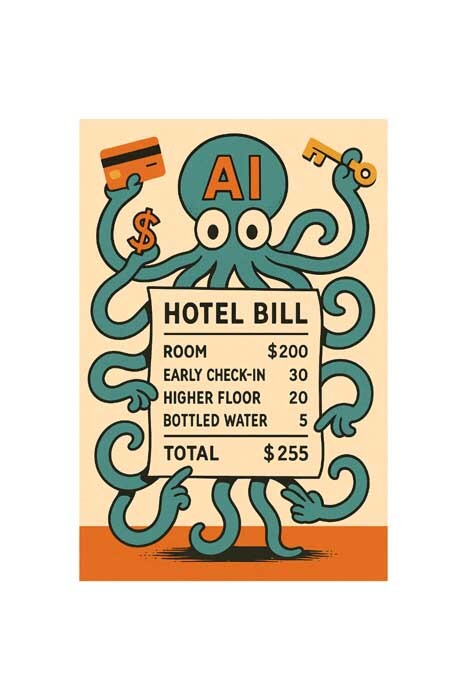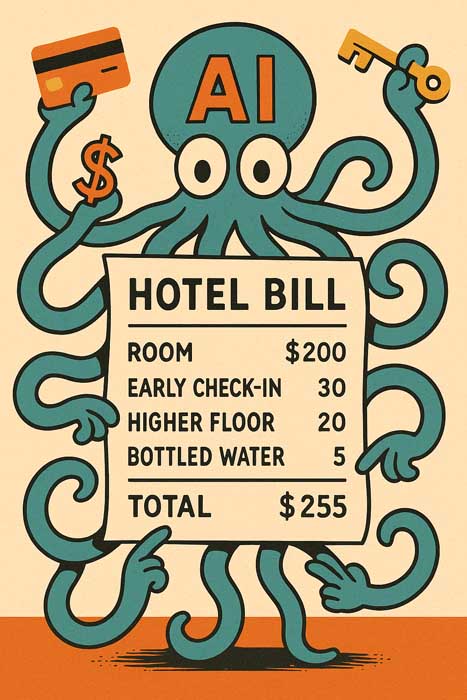News Staff![]() November 5, 2025
November 5, 2025
1K views 0 Comments 0 Likes

DLNews Business:
Hotels Tap AI to Turn Bookings into Profit Engines
The hotel industry is entering a new era of personalization — and profitability — as artificial intelligence transforms how guests book their stays. Increasingly, hotel reservations are beginning to resemble airline bookings, with AI-driven systems offering guests a range of add-on amenities beyond the standard room rate.
Instead of merely choosing a bed size or a view, travelers are now prompted to select extras like early check-in, late check-out, premium-floor rooms, or even in-room “hydration stations” stocked with bottled water. These once-inclusive services are now optional upgrades, designed to boost revenue per guest while creating a more customized experience.

The strategy mirrors the airline industry’s wildly successful ancillary revenue model — where seat selection, baggage fees, and meal upgrades have become standard fare. For hotels, the approach offers a new way to grow profits without increasing base rates, especially in an environment where operating costs, wages, and energy expenses continue to rise.
Major hotel groups are leading the charge. Wyndham Hotels, for example, has integrated AI-powered messaging that contacts guests 24 hours before arrival, offering locally relevant upgrades and experiences. Other large chains and boutique properties are following suit, using AI not just to streamline check-ins or handle routine questions, but to intelligently surface add-ons tailored to each guest’s profile, length of stay, and even purpose of visit.
This shift marks a broader transformation in hotel revenue management. For decades, the focus was on occupancy rates and average daily rates. Now, the emphasis is shifting toward “revenue per guest” — the total income derived from each individual traveler through carefully designed upselling opportunities. By integrating machine learning and predictive analytics, hotels can anticipate what a guest might value most and offer it precisely when they’re ready to buy.
For the Coachella Valley and greater Palm Springs area — a region built on tourism, festivals, and luxury hospitality — this change could prove especially significant. Local hotels already cater to diverse visitor types, from international travelers attending the Coachella and Stagecoach festivals to affluent vacationers seeking wellness retreats or desert golf getaways. AI-powered upselling can help these properties maximize returns during peak seasons while giving guests more control over their stay experience.
Imagine a visitor booking a weekend at a Palm Springs resort being offered an early check-in on festival weekend, a poolside room upgrade, or a private shuttle to the concert grounds — all automatically presented during or after booking. Those micro-transactions, multiplied across thousands of stays, could generate millions in new revenue annually for the regional hospitality sector.
The economic ripple effects could extend beyond hotels. As guests spend more on tailored experiences, nearby restaurants, spas, and tour operators may also see a boost. The entire tourism ecosystem — from boutique retailers to transportation providers — benefits when travelers invest more in convenience and customization.
However, with new opportunity comes new responsibility. Hoteliers must ensure these AI-driven offerings enhance rather than complicate the guest experience. Overloading customers with upsell prompts or hiding essential services behind paywalls could risk alienating repeat visitors. The key lies in balance — using AI to anticipate and satisfy, not to exploit.

Desert Local News is an invitation-only, members-based publication built on fact-checked, non-biased journalism.
All articles are publicly visible and free to read, but participation is reserved for members—comments and discussion require an invitation to join.
We cover local, state, and world news with clarity and context, free from political agendas, outrage, or misinformation.
Comments